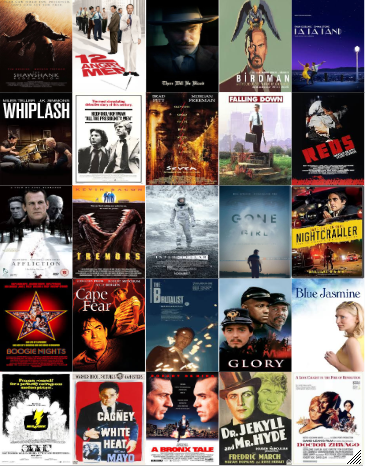I don’t engage with foreign cinema nearly as much as I would like to.
It’s a fact that I’ve always been aware of but really haven’t made any significant moves towards changing. I’m not in any way adverse to foreign cinema: I don’t have any issues with reading subtitles while watching a movie, and I think those who do are absolutely ridiculous. I don’t have any cultural bias against foreign cinema, I’m willing to watch anything from anywhere, (except for Human Centipede because screw that).
No, there really isn’t a reason for my lack of engagement with the stories of far away lands.
That being said, believe me when I say that I had absolutely no intention of ever reviewing a foreign film here. Like I’ve previously stated, I’ve only ever really wanted to talk about my favorite/ least favorite films and unfortunately no foreign films fit that margin. Meaning that the circumstances to why I am writing this are very different to that of my previous works.
For one, this is for an assignment that’s actually going to face a grade beyond that of the court of public opinion. That and the fact that I didn’t really CHOOSE to review this movie, it kind of just fell into my lap.
Let me briefly explain.
When I was first told about this assignment my original intention was to talk about Mike Figgis’ Leaving Las Vegas, a film that I remember enjoying but it had been a while since I had actually seen it. But apparently I got lost along the way to watch it because instead of doing that I ended up watching this movie. 8 ½ a film by esteemed Italian director Federico Fellini. I’d parroted the works of Fellini for a while without actually seeing one of his films. I knew that 8 ½ is considered to be one of his best, so without any consideration for how it would affect my project as a whole I put it on.
What I saw was…. Weird.
And not just weird by post-war, mid twentieth century Italian cinema standards. But weird by the standards of the basic way film is meant to be structured.
To explain the plot of 8 ½ would be doing it a great disservice, as it’s a film where the plot is ment to take a back seat to the themes. But for the sake of comprehension I will try my best to explain what I think is going on.
8 ½ is, in its simplest form, a movie about the process of making movies. However as you should know by now, nothing about a film is ever just “simple”. Intercut with the scenes of the inner film’s film’s pre-production, or lack thereof, are scenes from the past, present and possibly future of the main character and director of the film inside of a film, Guido.
Guido is played by famous Italian actor Marcello Mastroianni who not only had a very successful career in America but who also starred in Fellini’s most well regarded film La Dolce Vita.
Guido, putting it bluntly, is actively falling apart at the seams. His health is in sharp decline, he’s been cheating on his wife for months and he just can’t seem to come to a decision about anything.
Marcello Mastroianni plays Guido like he is carrying a heavy burden and that he’s some sort of martyr that should be worshiped for how well he handles all the issues life has placed upon him. On Guido’s face there is always a mixture of exhaustion and depression as his mental state gradually becomes worse and worse.
Whenever we see Guido like this, or when he is supposed to be the main focus of a scene the camera is always positioned uncomfortably close to his face. His head takes up most, if not the entire frame, as he delivers dialogue that the audience becomes intimately familiar with the slight subtleties in the way his face shifts and contorts as he talks and thinks. They are constantly exposed to his anguish and in some strange way they eventually end up feeling it too.
However, Guido’s problems really do not originate from external sources, most if not all of them come from his own actions and or inaction.
The most significant of these is the continuous cheating on and mistreatment of his wife Louisa.
The relationship between Guido and his wife, to call it contentious would be to brazenly misuse that word. They tolerate each other at best and hate each other at worst. He’s a serial cheater and she’s all but completely disassociated from the marriage. Guido, in the need to satiate his growing feelings of lust and discontent with his own life, pursues a young woman named Carla.
Carla is, for all intents and purposes, everything Louisa is not. She’s young and energetic and bursting with excitement for life and all its wonders. She is exactly what Guido needs at this point in his life.
There’s a reason why older guys go for younger girls, aside from the one you’re thinking of. They go for young girls because it makes them feel young again. When a man enters the twilight of his life he is forced to confront the fact that he is no longer the attractive charismatic person he used to be. This is a fact that most men aren’t ready to immediately face. So they try to delay the inevitable for as long as they possibly can.
This is colloquially known as a “midlife crisis”, something that Guido is experiencing head on.
In his mind the fact that Carla wants to be with him means that he’s not getting old. He can still attract young women in likely the same way he attracted his wife all those years ago. He’s still young, he’s still the man he used to be and there’s nothing you can do to convince him otherwise.
However the pursuit of combatting his midlife crisis is not the only reason behind why he decides to sleep with Carla.
Guido has some, let’s say, “old fashioned” views on women and their role in society.
There’s about a ten minute sequence that takes place entirely in his fantasies.
In Guido’s perfect world he is at the center of it. All of the women in his life, regardless of their actual relationships are completely subservient to him. His views on women have been heavily skewed by the women he knew throughout his formative years. This scene in the way it’s initially structured is meant to mirror that of a scene seen earlier in the film that takes place early on in his childhood.
To talk about that scene real quick: Guido is young, maybe about four or five, and living at a church orphanage. The women there are all doting over him constantly asking “Am I your favorite?” as they put him in a bath and send him off to bed. This, in Guido’s mind, is what life should be, not a care in the world. No need for you to make decisions when everything is done for you.
Now whether or not this event, or ones like it, actually played out like they are depicted to be is not important. The important thing is that it’s how Guido BELIEVES they happened. His early childhood memories of women, whether they are accurate or not, extend well into his adulthood.
So in this fantasy Guido is treated like how he was when he was a little boy. All the women in his life doting over him as they hang on his every word and command. However unlike when he was a boy, here Guido is the one with the power. The women don’t dote over him because they love him, they do it because they are afraid of him. As the scene continues the facade of this blissful existence begins to slip as the women realize how poorly he treats them. They decide that they’ve had enough and plan to “overthrow” him.
Unfortunately this uprising doesn’t last long, as Guido quickly takes control back by literally whipping the women back into shape. However the most interesting part of this whole sequence is the way Guido’s wife is portrayed.
In Guido’s perfect world his wife is a subservient and docile woman, who doesn’t speak unless spoken to. All she really does all day is house work and possibly sleep with Guido whenever he’s in the mood. This is in stark contrast to who his wife actually is. She’s a strong, opinionated woman who doesn’t subscribe to the traditional standards of femininity.
She has short, pixie cut hair, a strong chin, is always seen in a collared shirt and wears big bulky glasses that are not too dissimilar to Guido’s.
Louisa doesn’t care how her husband perceives her because she lost any sense of respect she had for him a long time ago.
Guido refuses to accept that a woman, especially his woman, wouldn’t live for him like he expects her to. So he changes her in his mind into exactly what he expects her to be, a housemaid that dresses appropriately who quite literally embodies the saying “seen and not heard.”
To Guido, women aren’t people, at least not in the same way he is. They are beneath him, they are subservient to them. Their only purpose in life is to fulfill his every wish and when they refuse he reserves the right to beat them into shape through whatever means necessary.
Guido is a bad person who finds himself in a position of power over others. As his life collapses around him he has to revert back to his childhood when things made sense. Where he didn’t have to make decisions, where everything just went his way, when life was just like a never ending movie.
8 ½ is a film that provides for quite a lot of analysis. There are so many themes and ideas that one could extract from the characters and their dialogue. However, I think if I were to continue on I’d end up just paying lip service to them instead of providing any real insight.
This was the hardest film I’ve had to review to date. There’s so much going on that to latch onto one theme or message ended up being a more difficult task than I thought it would be. However I quite enjoyed the challenge of providing an in depth analysis of a movie I wasn’t wholly familiar with. The much shorter turnaround time for this in comparison forced me to be more concise, maybe I should do this again sometime….
No. But it was fun
In terms of rating I’d probably give it an 8.5/10.
I’m only being HALF cute with the rating.
This was a weird one, but a good one.
Until next time
“In reel time”
Tristan Good































